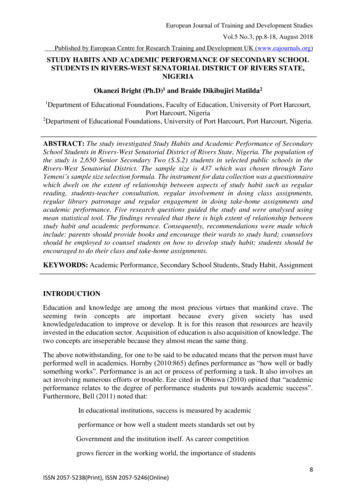
Transcription
1Essential Guide to Studying in Germany For FreeCopyright 2020 - www.studying-in-germany.org
Copyright 2020 by Studying-in-Germany.orgAll rights reserved. No part of this publication may be reproduced,distributed, or transmitted in any form or by any means, includingphotocopying, recording, or other electronic or mechanical methods,without the prior written permission of the publisher, except in the caseof brief quotations embodied in critical reviews and certain othernoncommercial uses permitted by copyright law.We have made all reasonable efforts to ensure that the contents arecorrect. However, we do not guarantee the completeness or accuracy ofinformation and shall not be responsible for any errors, omissions orinaccuracies. Any or all of the content is only for informative purpose &is in no way legally binding.If you find any errors or inaccuracies, or you have any suggestions,please send us an email directly to support@studying-in-germany.orgUpdated and revised as of August 20202Essential Guide to Studying in Germany For FreeCopyright 2020 - www.studying-in-germany.org
About This GuideWe have created this Study in Germany guide to help international students increase theirchances of getting admitted at a German university, learn more about the requirements forinternational students, and best prepare themselves for studying and living in Germany.This guide covers all the stages you need to go through and the actions you need to take fromgathering the early information, preparatory stage, and all the way to staying in Germanyafter graduation, so you can make your dream of studying and living in Germany a reality.Our guide will help you have the best experience studying and living in Germany as aninternational student, without the issue of figuring everything out on your own.In this guide you will find answers to: What is the real cost of studying in Germany and do universities really offer freetuition education for international students? Do you have to speak German fluently to study in Germany or is English languagesufficient? What are the main requirements to study in Germany, how to increase your chancesof admission at a German university, and where to look for scholarship opportunities. Who needs a student visa and how to get one? Can you work in Germany during/after your studies? And a lot more inside.3Essential Guide to Studying in Germany For FreeCopyright 2020 - www.studying-in-germany.org
ContentsAbout This Guide. 1STAGE I - Planning and Preparing to Study in Germany . 51. Things to Know About Studying Abroad . 62. Things to Know About Studying in Germany . 62.1. Top 5 Reasons Why to Study in Germany as an International . 62.2. Higher Education Institutions, Study Levels, and Degrees Available in Germany . 82.3. Extensive Variety of Study Programmes Available by German HEIs . 92.4. Available Study Languages in German HEIs . 112.5. Living Costs for International Students in Germany . 122.6. Covering the Living Expenses in Germany as an International Student. 132.7. Requirements to Become an Eligible Applicant to Study in Germany . 152.8. General Requirements for University Admission in Germany. 192.9. Visa Application Process and Requirements . 222.10. Key Study Dates of German Higher Education Sector . 232.11. Being Punctual for a Successful University Application . 23STAGE II - Applying for a Study Programme . 251. Meeting the Requirements to Become an Eligible Applicant to Study in Germany . 272. Applying for a Study Programme in a German HEI . 293. Applying for University Admission Using One of the Three Channels . 304. Deadline for Receiving an Answer From University . 35STAGE III - Before and After Arriving in Germany . 361. Applying for a German Visa . 382. Things to Do Before Travelling to Germany . 413. Preparing to Leave for Germany . 444. Arriving to Germany . 465. Student Life . 476. Career in Germany . 53Frequently Asked Questions (FAQs) . 544Essential Guide to Studying in Germany For FreeCopyright 2020 - www.studying-in-germany.org
STAGE I - Planning and Preparing to Study in GermanyPlanning and preparation are essential steps for studying in Germany. This means, you willneed to know how to properly plan and prepare so that you see yourself pursuing yourqualifications in Germany in no time.This section will help you understand the higher education (HE) sector and the livingconditions/environment in Germany. Once you get an understanding of these, you will beable to choose a study programme that best suits your interests.Commitment is an important factor when it comes to studying and living in Germany.Everything you do towards your goal to study in Germany, commit to it and do not give upwhen things get challenging. For a simpler process, from start to finish, go through ourguide.In this guide, you will find the key pieces of information, tools, and instructions to getyourself in Germany and create your dream career. The following pages will cover therequirements to study in Germany, the visa application process, admission requirements,living costs, and more.5Essential Guide to Studying in Germany For FreeCopyright 2020 - www.studying-in-germany.org
1. Things to Know About Studying AbroadStudying abroad has a wide range of benefits, both professional and personal. It is anexperience that will change your life for the better, helping you become an independentperson, excel in the labour market, and create life-long memories and friendships.As an international student, you will learn to manage your time, finances, and prioritize yourneeds. Apart from the academic benefits of studying abroad, the aforementioned skills areessential if you want to become successful in your chosen field.1.1. Advantages of studying abroadThe main advantages of studying abroad include: Academic knowledge boost. Social and cultural knowledge boost. Internationally recognized study degrees. Career prospects in the global labour market. Second/third language improvement. Improvement of soft skills (people, social, and communication skills) Improvement of hard skills (professional skills) Increase in diversity understanding.1.2. Disadvantages of studying abroadDisadvantages of being an international student include: Being away from family and friends. Managing living costs on your own.2. Things to Know About Studying in GermanyGermany is an ideal place to study for international students who want to pursue theirhigher education qualifications. The higher education system is unmatched and highlyregarded, which essentially is what makes Germany, as a study destination, so valuable andworthy.Germany is a place of culture and art, and its quality of education is one of its mostdistinguished aspects. Throughout the years, this country has created some of the mostsuccessful people in the world, through its education and expertise.2.1. Top 5 Reasons Why to Study in Germany as anInternationalHere are five things that make Germany a top-notch country to pursue a degree:6Essential Guide to Studying in Germany For FreeCopyright 2020 - www.studying-in-germany.org
Reason 1: Germany Has Free Education and Internationally RecognizedQualificationsMost public German universities are free of tuition fees after the government approved adecision to abolish international fees in all public colleges in 2014. In the majority of highereducation institutions, all you will be required to pay is a small amount dedicated toadministrative and public transportation costs. Depending on the university, this paymentranges somewhere between 150 and 250 per semester.But this is not all, German higher education institutions offer internationally recognizeddegree programmes which provide students with the necessary means to enter the global jobmarket and tackle the issues of society. Having an internationally recognized degree givesyou an extra edge and provides you with the confidence you need in today’s competitivelabour market. Germany has recognized what students need and has made those needs apriority.Reason 2: German Universities Are Ranked Among the Top World’s BestUniversitiesDue to their academic, teaching, and learning quality as well as the contemporaryenvironment, scientific paper citation numbers, a good international reputation, greatinternational students proportion and other quality standards, numerous Germanuniversities stand among top world universities. This further proves that higher educationinstitutions in Germany know what is essential and needed in the world today.According to two of the most renowned and credible higher education rankingauthorities: The Times Higher Education World University Rankings 2020 ranked 8 (eight)German universities among the top 100 world’s best universities. QS World Rankings 2020 ranked 8 (eight) German universities, among the top 150world’s best universities.Reason 3: Germany Offers a Variety of Attractive International StudyProgrammesGermany offers countlessdegree courses designed tosuit everyone’s interests. Asan industrialized countryGermany has invested a lotin engineering universitiesand today engineeringprogrammes are particularlyvalued at Germanuniversities. However, thereare numerous other studyprogrammes offered at theseuniversities, including7Essential Guide to Studying in Germany For FreeCopyright 2020 - www.studying-in-germany.org
medicine and pharmacy where they are global leaders.German universities offer a wide variety of more than 1,500 international programmesavailable for international students. Students get the opportunity to choose among numerousoptions, such as studying in German only, English only, or a combination of both. This isespecially convenient for students who cannot speak the German language but areparticularly interested in pursuing a degree from one of the many renowned Germanuniversities.To find international programmes (but not only) check the DAAD database here.Reason 4: Germany Offers an Appealing Dual Education System inGermanyEducation providers in Germany harmonize dual aspects of learning, such as theory andpractice, something that greatly facilitates the student’s understanding of labour markettrends and needs. Theoretical knowledge and practical knowledge might be ‘good enough’ ontheir own, however, when they combine, they increase the employability rate by creatinggraduates with crucial skills.Reason 5: Germany Is the Perfect Place to Build a CareerProspects to enter the local labour market for a graduate in Germany are decidedly good. Thedual education system, as aforementioned, does not only provide a degree but an immensecareer perspective, offering the opportunity for students to become active members of thedeveloped German economy. Regardless of your academic field or country of residence, yourGerman degree will help you build your career.2.2. Higher Education Institutions, Study Levels, and DegreesAvailable in GermanyDepending on what students are interested in and their circumstances, Germany offers alarge range of higher education institutions, different and attractive degree programmes, atall study levels. Basically, students have numerous options to choose from, since everydegree programme you might be interested in, can probably be found in Germany, at aconvenient cost.2.2.1. Three Categories of HEIs Available to Internationals in GermanyGermany has a range of higher education opportunities available, depending on the student’sfocus and preference. In Germany, students can choose from the following: Universities - typically scientific-research oriented, Universities of Applied Sciences - mostly oriented toward professional practices,offering several internship opportunities during studies, Colleges of Art, Film and Music - dedicated to passionate individuals on creativeand entertainment aspects.2.2.2. Levels of Study Obtainable by International StudentsBased on the highest degree of the student, Germany offers the three following study levels:8Essential Guide to Studying in Germany For FreeCopyright 2020 - www.studying-in-germany.org
Undergraduate studies - for first-time students,International exchange - students willing to complement their studies with a year or asemester of studies in an international institution abroad (bachelor or master),Graduate studies - for bachelor graduates,PhD studies - postgraduate studies, for students who have received their master degree.2.2.3. Study Degrees Offered by German HEIsThere are three study degrees that German HEIs provides: Bachelor Degree (BA, BSc, BSEng) - First academic degree.6-8 semester programme, 3 to 4 years, awarding 180 up to 240 ECTS Credits. Master Degree (MA, MSc, MEng) – Second academic degree.2-4 semester programme, 1 to 2 years, awarding 60 up to 120 ECTS Credits. PhD Degree – Third academic degree.4-10 semester programme, with a research work (dissertation), concluded with adoctorate.2.3. Extensive Variety of Study Programmes Available byGerman HEIsThere are over 400 HEIs inGermany, offering an extensivevariety of study programmes, suchas Economic Sciences, Law,Agricultural and Forest Sciences,Art, Music, Design, EngineeringSciences, Humanities and SocialSciences, Language and CulturalStudies, Mathematics, NaturalSciences, Medicine, Health Scienceand Education. Programmes areavailable to local and internationalstudents alike.2.3.1. Online Channels forSearching Study Programmes and Universities in GermanyWhen looking for online channels of finding a preferred study programme and/or preferreduniversity there are several options, which can help you. If you are searching for a specificstudy programme, the following online databases offer categorized information in thisregard: Online database for searching all available study programmes in Germany here.9Essential Guide to Studying in Germany For FreeCopyright 2020 - www.studying-in-germany.org
Offering a comprehensive list of around 20,000 study programmes availablein Germany.Online database for searching only International Study programmes in Germanyhere. Offering a categorized list of over 1,500 international programmes available inGermany.The below online resources might greatly assist you in finding the ideal university: Top universities in Germany based on specific study fields - offering an extensivecategorized list of universities in Germany, if searching for subject-specializeduniversities, e.g. best universities for Business or Technologym Comprehensive list of universities in Germany - offering a wide comprehensive list ofuniversities in Germany, if searching for all existing universities in different locationsof Germany.Top Business Schools in GermanyGISMA Business SchoolBerlin School of Business and InnovationEU Business SchoolIUBH University of Applied SciencesLancaster University LeipzigUniversity of Applied Sciences EuropeArden University Berlin10Essential Guide to Studying in Germany For FreeCopyright 2020 - www.studying-in-germany.org
11Essential Guide to Studying in Germany For FreeCopyright 2020 - www.studying-in-germany.org
2.4. Available Study Languages in German HEIsDepending on the study programme you choose, there are three main study languages inGermany:1. German only,2. English only,3. English and German.2.5. Living Costs for International Students in GermanyBefore making the decision to go to Germany and pursue a degree, it is important to getinformed about living costs and expenses. The cost of living in Germany is quite reasonablecompared to other European countries. One of the largest expenses in Germany is rent.On average, you will need around 853 EUR/month to cover your living expenses in Germanyas of 2020 (around 957 US dollars) or 10,236 EUR/year (around 11,484 US dollars). Thecost of food, accommodation, bills, clothes, and entertainment are basically in line with theEU average.Here are the essential monthly expenses for an average international student in Germany:Category:Average Cost:Tuition FeesNoneSemester Contribution 150 - 250 per semesterAccommodation 350 - 500 per monthPublic Transport 80 per monthStudy Materials 30 per monthFood and Drink 165 per monthUtilities and Bills 215 per monthEntertainment 68 per monthHealth Insurance 103 – 111 per month (public)Clothing 50 per month12Essential Guide to Studying in Germany For FreeCopyright 2020 - www.studying-in-germany.org
Note: Keep in mind that the prices shown in the above table list the expenses of an averageinternational student in Germany. The cost of accommodation will be lower/higherdepending on the type of accommodation. Student halls, for example, are the cheapest formof accommodation in Germany, while private apartments and shared flats are moreexpensive. The cost of utilities and bills is typically divided depending on how many peopleyou live with.Living costs for different types of expenses in some of the main German cities:MunichBerlinHamburgFrankfurtRent 1,094.30 795.90 838.94 868.91White bread(500g) 1.43 1.27 1.27 1.29Restaurantmeal 12.25 8.00 10 12Milk (1liter) 0.84 0.79 0.71 0.77Eggs (12) 1.71 1.77 1.78 1.61Rice (1kg,white) 2.14 1.79 2.15 1.97Tomatoes(1kg) 2.82 2.62 2.61 2.61Potatoes (1kg) 1.00 1.32 1.04 1.29Beer (0.5liter) 3.80 3.50 4.00 4.00Taxi 1km 1.90 2.00 2.00 2.00Find the cost of living in Germany detailed at length in this article.2.6. Covering the Living Expenses in Germany as anInternational StudentThere are different forms of covering living expenses while studying in Germany as aninternational student. The information below will help you understand the possible waysinternational students can finance their expenses.13Essential Guide to Studying in Germany For FreeCopyright 2020 - www.studying-in-germany.org
Here are the common ways international students choose to finance their livingexpenses in Germany: Parents, family, or guarantor support - parents or other relatives might decideto financially support your living costs during studies by providing a monthlyfinancial assistance, also a guarantor (German citizen) might be your eligible fundingsource, International Scholarships - there are several scholarship opportunities availableto help you financially while studying in Germany, offering full and partial financialsupport during studies in Germany. When you decide to apply for scholarships tostudy in Germany, the German Academic Exchange Service (DAAD) is the biggestscholarship database online to search for scholarships available in Germany, whileStudy in Germany is similarly a resourceful online tool helping to get this type ofinformation, Part-time jobs - This is the most common funding option chosen by internationalstudents and if considering to use this option to fund your living costs, there areseveral facts and legal limitations you should recognize, including: International students are eligible to work in Germany while studying, There is a law limitation in Germany with regards to the allowed hours ofwork for students, depending on your country of origin, Students are not allowed to work more than 120 full days or 240 half-days peryear, There is an exception if your job is as a student assistant, or research assistantat the university, where exceeding the limit of allowed hours of work it is notseen as an issue, however, the Alien Registration Office of the town whereyour university is located must be informed, It is not preferable for students to start working in the first semester, as thereis a certain time needed to get adapted to the study programme and workingmight have a negative impact on studies.14Essential Guide to Studying in Germany For FreeCopyright 2020 - www.studying-in-germany.org
2.7. Requirements to Become an Eligible Applicant to Study inGermanyThere are a few things thatshould be considered whendeciding to study in Germany,in order to be an eligibleapplicant. The process requiresyour full attention andcommitment, and it is nothingthat cannot be done with theproper instructions andinformation. The highereducation sector in Germanyrequires international studentsto provide the following, to beconsidered eligible:2.7.1. Higher Education Entrance QualificationA higher education entrance qualification or certificate of a general higher educationqualification, allows you to apply at university programmes and colleges in all Germanstates. If you are interested in studying at a German university, you will be required toprovide this qualification, also known as ‘Hochschulzugangsberechtigung’. This is a schoolleaving certificate which confirms you have the qualifications to begin university.In Germany, this university entrance qualification is known as ‘Abitur’, while forqualifications for a university of applied sciences, secondary school graduates receive what isknown as ‘Fachhochschulreif’. If you come from an EU country, Liechtenstein, Iceland,Norway orSwitzerland, your qualifications will be recognized in Germany, otherwise, you will have toenter an exam.Check the DAAD database to see if your school-leaving certificate is recognized in Germany.2.7.2. Free Short Preparatory CoursesShort preparatory courses are courses offered to international students of three categories:those who need recognition of an early education, who need recognition of education to enteruniversity, and individuals in need of knowledge in a specific field related to their studyprogramme.The short preparatory courses to study in Germany, include:Propaedeutic CoursesGerman universities usually offer free preparatory short courses known as “propaedeuticcourses” to help potential applicants get the needed knowledge and preparation for theadmission into specific HEIs. These courses are offered typically for the candidates whoseearlier education is recognized in Germany, but want to prepare themselves for a specificdegree programme.15Essential Guide to Studying in Germany For FreeCopyright 2020 - www.studying-in-germany.org
Test for Academic Studies (TestAS)TestAS is an examination, which helps prospective applicants to study in German HEIs andperceive their ability to meet specific programme criteria. The results of this test also serve ashelp when it comes to choosing a study programme. Passing this test successfully alsoincreases the chances of getting admission to German universities. A great thing about thistest is that applicants can realistically assess their chances of finishing a degree programme.You can find more information on TestAS and its fees and assessment periods on the officialwebsite here.Foundation courses (“Studienkolleg”)These courses are aimed at candidates whose education is not recognized in Germany.Specifically, if your earlier education is not recognized in Germany, you are required to take aqualification assessment examination known as “Feststellungsprüfung”. To prepare for this,you can enter a foundation course, “Studienkolleg”, in order to properly prepare for theexamination.Courses are offered on subject specific areas, usually lasting up to 2 semesters, typicallyoffered for free by universities. Usually students undergo the examination 1 year after thebeginning of the course. But if they show an above-average achievement during the course,they may enter the examination after one semester as well.Students willing to get enrolled in this course, must have at least German languageproficiency B1 level – Common European Framework Reference for Languages. Uponsuccessfully passing the examination, students will qualify as legitimate applicants to enterhigher education institutions in Germany.Studienkolleg in Germany will provide you with the necessary information on fees,requirements, and application process.2.7.3. Proving Your German Language ProficiencyThe majority of German universities offer study programmes in German language, therefore,German language proficiency is necessary if you choose to apply for your studies in suchprogrammes.However, this does not apply to several international programmes, which have English onlystudy programmes. In addition, some universities do not require knowledge of Germanlanguage for students who are on an exchange experience for a semester or two.In addition, some universities offer a combination of programmes of English and Germanlanguages and in such cases, English and German language proficiency is necessary.German language proficiency can be proved with the following: German Language University Entrance Examination for International Applicants(DSH), Test of German as a Foreign Language (TestDaF), Goethe Institut German Language Diploma (GDS),16Essential Guide to Studying in Germany For FreeCopyright 2020 - www.studying-in-germany.org
German Language Diploma of the Standing Conference of the Ministers of Educationand Cultural Affairs, Level II (DSD)For courses held in German, DSH 2 or TestDaF 4, at the time of course, begin at least atLevel A2.There are free online courses and tools to assist in learning the Germanlanguage, such as the following: Here is a comprehensive guide on learning German language for beginners.These free portals offer lessons, readings, writings, listening and they test your knowledge.However, they do not offer a recognized language certificate and yet the aforementionedforms are the only accepted proof of German proficiency level.Watch the video for more: Student life: How much German do I need in Germany?2.7.4. Proving Your English Language ProficiencyIf you choose to apply to studyin English only programmes inGermany, or English-Germancombined study programmes,proof of English languageproficiency is required uponapplying. The following arerecognized examinations,when it comes to proving yourEnglish Language proficiency:TOEFL Test ResultsTest of English as a ForeignLanguage and is the most common form of proving English language proficiency. TOEFLcenters worldwide are where you can get the information online on each country’s TOEFL’stesting dates. Valuable information and materials can also be found on TOEFL testpreparation.The level of required English proficiency can differ depending on university requirements,however Europe generally requires from students to have the following test results:The general recognized test results are: PbT (paper-based test): 550 Points CbT (computer-based test): 213 Points IbT (internet-based test): 79-80 PointsIELTS Test Results17Essential Guide to Studying in Germany For FreeCopyright 2020 - www.studying-in-germany.org
The International English Language Testing System is the second most common form ofproving the English Language proficiency. Same as TOEFL, IELTS.org is the official websitewhere you can get all the information on testing dates and more about IELTS.While, if you chose to follow a course in your country, there are centers and/or institutionsspread around the globe, which prepare individuals for the TOEFL Test, and IELTS, with anamount of tuition fee applicable.The general recognized test results are: 5.5 – 6.5 ScoreOther commonly accepted forms of proving your English language proficiencyfor academic studies in Germany include the following: Educational Certificate of an English-Speaking School. You must havecompleted at least 5 (B1) /6 (B2) schooling years in a school whose main language ofinstruction was English. Cambridge English Certificates. Any of the following, depending on the highereducation institution’s requirement: B1 Preliminary (rarely). B2 First. C1 Advanced. C2 Proficiency. UNIcert minimum I (B1) or II (B2). TOEIC certificate. University Entrance Qualifications obtained in an English-speakingcountry. University Degree obtained with a higher education of an Englishspeaking country.18Essential Guide to Studying in Germany For FreeCopyright 2020 - www.studying-in-germany.org
2.8. General Requirements for University Admission inGermanyGermany has a diverse HEapplication system. There arethree common channels orintermediating institutions,through which the applicantcan submit their universityapplication. Consequently,there are numerousapplication procedures thatsomewhat differ from eachother, yet, the generalapplication requirements aresimilar whatever the channelof application is.The generalized list of documents required to apply for university admission in Germany asan international student includes:Completed Application Form (Soft and Hard Copy)The application form is the key requirement of the
German universities offer a wide variety of more than 1,500 international programmes available for international students. Students get the opportunity to choose among numerous options, such as studying in German only, English only, or a combination of both. This is especially convenient for students who cannot sp










